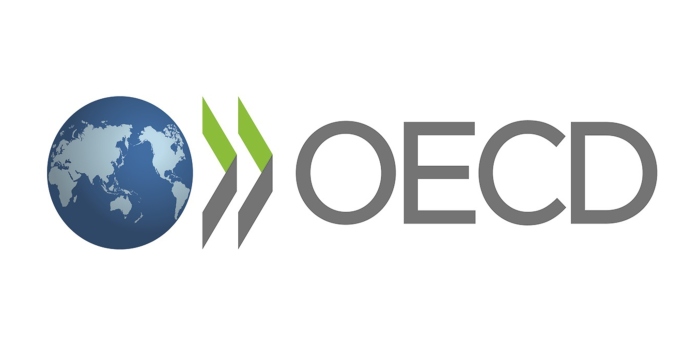New due diligence requirements for companies in the agri-food sector: norm diffusion and partner uptake
Scientific Advisory Board on Agricultural Policy, Food and Consumer Health Protection at the BMEL (WBAE)
OECD
Aktivierung erforderlich
Wir möchten Sie darauf hinweisen, dass nach der Aktivierung Ihre Daten an Youtube übermittelt werden.
Summary of topics and results
LkSG, EUDR, CSDDD – various acronyms have been created that represent regulations on national and on EU level that expand the responsibility of companies in importing countries for their supply chains. On this panel, experts discussed the possible effects that this development will have on trade, human rights and labour standards along supply chains and how companies, suppliers and producers on both ends of the supply chain are equipped to deal with these new due diligence obligations.
The foundation of the discussion was laid by two recent reports published on the topic of due diligence regulations in the agri-food sector. Professor Christine Wieck started off with her keynote speech by presenting key recommendations by the Scientific Advisory Board at the BMEL (WBAE). The group of scientists analysed the new regulations from a multidisciplinary perspective and derived three packages of recommendations, which they presented to German Federal Minister of Food and Agriculture Cem Özdemir in December. The audience was then given a full picture of mandatory and voluntary due diligence measures in the G7 by Sophia Gnych of the OECD’s Centre for Responsible Business Conduct. A key take-away was that 63 % of the measures within the scope of the OECD review were only introduced in the past three years, which is a clear indication of a recent norm diffusion within the G7.
Following these two insights, the expert panel invited perspectives on this extension of due diligence regulations from the following panellists: Gunther Beger of the directorate for SDG Innovation and Economic Transformation at UNIDO, who was also closely involved in the drafting of the German Supply Chain Due Diligence Act, Dr Leonard Mizzi of the European Commission, who is Head of Unit at the Directorate-General for International Partnerships, responsible for sustainable agri-food systems and fisheries, Dr Bettina Rudloff from the German Institute for International and Security Affairs in Berlin (SWP), who contributed to the recent report by the WBAE through her expertise at the interface of trade, agricultural policy and foreign policy, and Dr Johannes Graf von Keyserlingk, who is the head of Corporate Social Responsibility at Handelsverband Deutschland, a leading organisation in the German retail sector.
In the intense discussion, facilitated by Prof Achim Spiller, various issues were highlighted, including the risk that due diligence regulations could become a “boomerang” – meaning that farmers at the beginning of the chain could be losing out, even though the improvement of their situation is a key objective of the regulation. To mitigate such risks, support measures need to be put in place. The Team Europe Initiative, which is a collaborative effort by the European Commission, the Netherlands, Germany and France in order to assist producing countries in responding to the regulation on deforestation-free supply chains serves as one example for such support measures. The role of certification schemes as one tool for companies to fulfil their due diligence regulations was another topic that also resonated with the audience. In their expert report, the Scientific Advisory Board recommended that certification schemes should play a pivotal role, e.g., due to the large number of business relationships, but that their quality needs to be improved first and guaranteed officially. The panel collectively agreed that the initial implementation phase of such regulations should be considered a learning period, allowing for minor errors by companies. A collaborative approach with the competent authorities overseeing implementation was emphasised as crucial during this phase.
Speakers
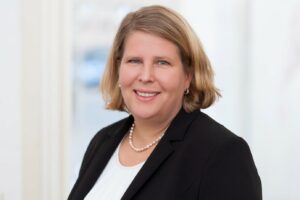
Christine Wieck
Keynote-SpeakerMember and lead author / Scientific Advisory Board to the Federal Ministry of Food & Agriculture (WBAE) | University of Hohenheim Show CV / Vita
CV / Vita
Christine Wieck is professor for agricultural and food policy at the University of Hohenheim. Her research, teaching and outreach centers on the quantitative and qualitative analysis of agricultural and food policies in a globalized world with a special focus on the sustainable transformation (greening) of the EU food system and EU-Africa relationships on agri-food matters. Prior to returning to academia, she worked in the years 2015-2018 for the German Development Agency (GIZ) as an agricultural trade policy advisor. She started her agricultural career with a vocational training as a farmer and worked for several years on organic dairy farms in the West of Germany.
In 2020, she was appointed a member of the scientific advisory board of the German Federal Ministry of Food and Agriculture. From April 2018 to March 2019 she was appointed to the Task Force “Rural Africa”, an independent advisory body of nine experts to provide expertise, advice and recommendations to the EU commission on how to advance the EU-Africa relationships in agri-food matters and the coherence of EU agricultural, trade, environment, rural and development policies. She is also a member of the scientific advisory board of the German-African Business Organisation.
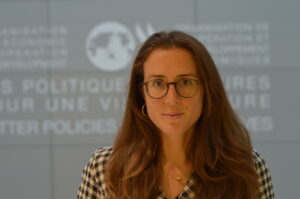
Sophia Gnych
Keynote-SpeakerPolicy Analyst / OECD's Centre for Responsible Business Conduct (RBC) Show CV / Vita
CV / Vita
Sophia Gnych is a Policy Analyst at the OECD’s Centre for Responsible Business Conduct (RBC) and was one of the lead authors of the Review of G7 Government-led Due Diligence Measures for Agricultural Supply Chains. At the Centre for RBC, Sophia leads the work on Due Diligence and Responsible Agricultural Supply Chains. She has extensive experience working on policy, regulation and standards in the agriculture and forestry sectors, including voluntary sustainability initiatives and certifications. Prior to joining the OECD, Sophia worked for the International Finance Corporation (IFC) in Indonesia, addressing access to technology, finance and markets for smallholder farmers and preparing them for certification. She also spent many years with the CGIAR’s Centre for International Forestry Research, conducting research on the production and trade of tropical agricultural commodities, and their environmental impacts. Sophia holds a BSc in Biology and a Masters in Global Environmental Change and Policy from Imperial College London.
Close CV / Vita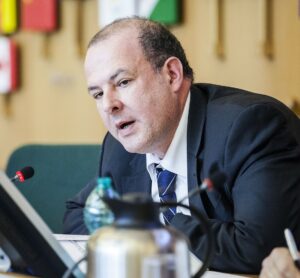
Leonard Mizzi
Keynote-SpeakerHead of Unit Sustainable Agri-Food systems and Fisheries / European Commission Show CV / Vita
CV / Vita
Dr. Leonard Mizzi is Head of Unit at the European Commission, Directorate-General (DG) for International Partnerships – Sustainable Agri-Food systems and Fisheries, since 1st of January 2017. Prior to this post he was Head of Unit for 10 years in DG Agriculture and Rural Development, first in charge of agri trade and development issues (2007-2014) and from 2015-2016 leading the inter institutional unit hence relations with the European Parliament, Council and consultative bodies and well as steering the Civil Dialogue Groups.
He is a graduate in Public Administration from the University of Malta (BA Hons First Class); and has degrees from CIHEAM-Montpellier (Master of Science) and a Ph.D in Agricultural economics from the University of Reading (UK). He has been an author of a number of articles and publications on agri food issues and nutrition in the Mediterranean region.
Dr. Mizzi has a broad working experience in the Maltese public administration and the Maltese private sector. He first worked in the Economic Planning Division of the Office of the Prime Minister (Malta) and from 1996-2006 was the first Director of the Malta Business Bureau in Brussels- the office of the Malta Chamber of Commerce and Enterprise and the Malta Hotels and Restaurants Association.
He was also visiting lecturer at the Boston University (Brussels campus), Open University and Malta University. He often lectures at the College of Europe in Bruges.
His areas of specialisation are global food security governance, agriculture and food and nutrition security, the Mediterranean and Sub Saharan Africa.

Achim Spiller
FacilitatorChair / Scientific Advisory Board to the Federal Ministry of Food & Agriculture (WBAE) | University of Göttingen Show CV / Vita
CV / Vita
Prof. Dr. Achim Spiller has been Professor of “Marketing for Food and Agricultural Products” at the Department of Agricultural Economics and Rural Development at the Georg-August University of Göttingen since 2000. His research focuses on consumer behaviour, sustainability management, animal welfare and supply chain management in agribusiness. Achim Spiller has written more than 200 articles for peer-reviewed scientific journals and numerous books, business consulting reports and policy recommendations.
Achim Spiller is a full member of the Academy of Sciences in Göttingen. Since December 2020 he has been chairman of the scientific advisory board for “Agricultural Policy, Food and Consumer Health Protection” with the Federal Ministry of Food and Agriculture.
In July 2020, he was appointed to the Future Commission on Agriculture set up by the Federal Cabinet of Germany. Since 2019, he has been a member of the BMEL Competence Network for Livestock Farming (“Borchert Commission”) at the invitation of the Federal Minister.
In the FAZ economist ranking, Achim Spiller was honoured as one of the 100 leading German economists in 2015, 2016, 2018, 2020 and 2021 respectively.Achim Spiller is chairman of the scientific advisory board of the “Animal Welfare Label of the German Animal Welfare Federation“.
From 2014 to 2016, he was a member of the Competence Group Animal Welfare at the personal invitation of the Federal Minister of Food and Agriculture; from 2013 to 2018, he was a member of the board of trustees of the German QS system, 4 years of which as chairman.
Close CV / Vita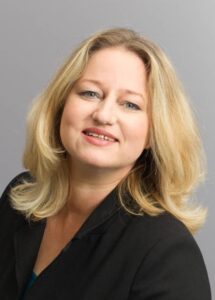
Bettina Rudloff
PanellistSenior Associate / German Institute for International and Security Affairs (SWP) Show CV / Vita
CV / Vita
Bettina Rudloff holds a PhD in Agricultural Economics from the University of Bonn, where she was also Assistant Professor at the Institute for Food and Resource Economics. At the European Institute of Public Administration (EIPA), Maastricht, she led training programmes for the EU Commission for WTO trade negotiators from developing countries.
She is currently conducting research at the German Institute for International and Security Affairs in Berlin (SWP) at the interface of trade, agricultural policy and foreign policy, for example on geo-strategic aspects of food security and trade policy. Among others she is a member of the strategic advisory group at the BMZ for the special initiative “Transformation of Agricultural and Food Systems” and the International Agricultural Trade Research Consortium (IATRC). She recently contributed as an external author to the latest report of the Scientific Advisory Council to the BMEL (WBAE) on corporate due diligence in the agricultural and food sector.

Johannes Graf von Keyserlingk
PanellistHead of Corporate Social Responsibility / Handelsverband Deutschland (HDE)
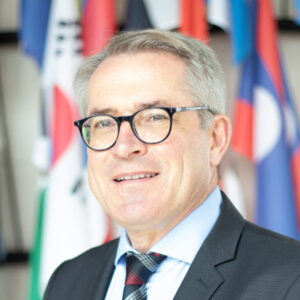
Gunther Beger
PanellistManaging Director, Directorate for SDG Innovation and Economic Transformation / United Nations Industrial Development Organization (UNIDO) Show CV / Vita
CV / Vita
The Directorate for SDG Innovation and Economic Transformation, responsible for the development of innovative services in areas of agro-industry, sustainability standards, fair production, and climate-improving technologies, the development of innovative technical cooperation concepts, and the identification of new sources of finance and new partnerships.
Until March 2022, Mr Beger served as Executive Director for Germany at the World Bank Group. From 2013-2021, he served as Director General in Germany’s Federal Ministry for Economic Cooperation and Development. From 2000-2013, he held several leadership positions in the German Federal Ministry of Food, Agriculture and Consumer Protection. From 1995-2000, he served as Head of Division for Agriculture at the German Embassy in Moscow, Russia.
Beger holds a Master’s degree in Agricultural Economics from Rheinische Friedrich-Wilhelm-Universitaet in Bonn, Germany.
Close CV / Vita

